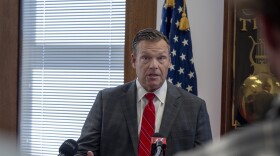-
The lawsuit is one piece of Kobach’s broad range of anti-immigration efforts.
-
A plaintiff in the case called Thursday's decision a "powerful step" toward protecting early education access.
-
A federal judge quickly and quietly cut off in-state college tuition for Oklahoma students without legal immigration status on Aug. 29.
-
The decision by a Texas federal court removed the lesser prairie chicken of any endangered or threatened species protections, which were established through a Biden-era ruling. The Trump administration had tried to reverse the designation, on behalf of livestock and oil producers.
-
United Nation of Islam, a quasi-religious group based in Kansas City, Kansas, was accused of forcing children to endure long, unpaid work days while living in crowded conditions with strict diets. Sentences for the six leaders range from five years of probation to 10 years in prison.
-
A federal appeals court has upheld an Oklahoma law prohibiting minors from accessing gender-affirming care, reinforcing a growing trend of legal support for such bans across the country.
-
A federal judge ruled that Kansas lawmakers were suppressing free speech when they passed a law targeting mail-in ballots. The law was passed one month after the Jan. 6, 2021, breach of the U.S. Capitol.
-
The ruling will prevent Army Lt. Col. Shane Vinales and his wife and family from receiving further damages they claim they suffered from living in privatized base housing.
-
A federal judge in San Antonio has ruled that the state of Texas for decades unnecessarily institutionalized 4,500 people with intellectual and developmental disabilities in nursing home facilities, denying them appropriate services that are required under federal law.
-
State Attorney General Gentner Drummond says he wants to prevent the company from selling its customers' private DNA information.

Play Live Radio
Next Up:
0:00
0:00
Available On Air Stations










